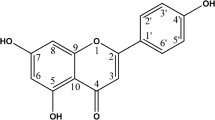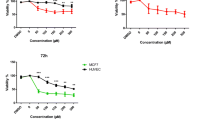Abstract
Recently, numerous studies have shown that natural compounds such as carvacrol can be used as therapeutic agents for medicinal purposes. Although carvacrol was found to suppress breast cancer cell lines, however, whether the therapeutic effect of carvacrol on breast cancer is caused by increasing the expression of pro-apoptotic genes in the MCF-7 cell line has not been studied. In this research, we investigate the effect of carvacrol on the expression of P53, pro-apoptotic Bax and anti-apoptotic BCL-2 genes in MCF-7 cells. After preparation and cultivation of MCF-7 cells, the IC50 value of carvacrol on the cells was evaluated by MTT assay, and then apoptosis induction was observed in the cell line treated with different concentrations of carvacrol by DAPI staining. To assess the expression level of Bax, P53 and Bcl-2 both in genes and protein levels QPCR method and western blot analysis were used. According to the results of the research, it was determined that the IC50 of carvacrol compound in MCF-7 cells is 305 µM. DAPI staining exhibit apoptosis and morphological changes in treated MCF-7 cells. Real-time PCR assay and western blot showed increasing the Bax and P53 expression and decreasing the expression of the Bcl-2 anti-apoptotic gene and protein. These results showed that carvacrol has cell growth inhibition effects on the MCF-7 cancer cell line. Carvacrol-induced p53-dependent apoptosis, which might be related to the Bax/Bcl-2 associated pathway. These results indicated that carvacrol could be considered suitable for the prevention and treatment of breast cancer.


Similar content being viewed by others
Data Availability
The data that support the findings of this study are available from the corresponding author upon reasonable request.
References
Li L, He L, Wu Y, Zhang Y. Carvacrol affects breast cancer cells through TRPM7 mediated cell cycle regulation. Life Sci. 2021;266: 118894.
Chen G, Wang C, Wang J, Yin S, Gao H, Xiang L, Liu H, Xiong Y, Wang P, Zhu X. Antiosteoporotic effect of icariin in ovariectomized rats is mediated via the Wnt/β-catenin pathway. Exp Ther Med. 2016;12(1):279–87.
Wang H, Mo S, Yang L, Wang P, Sun K, Xiong Y, Liu H, Liu X, Wu Z, Ou L. Effectiveness associated with different therapies for senile osteoporosis: a network meta-analysis. J Tradit Chin Med=Chung i tsa Chih Ying wen pan. 2020;40(1):17–27.
Azimi S, Esmaeil Lashgarian H, Ghorbanzadeh V, Moradipour A, Pirzeh L, Dariushnejad H. 5-FU and the dietary flavonoid carvacrol: a synergistic combination that induces apoptosis in MCF-7 breast cancer cells. Med Oncol. 2022;39(12):1–6.
Liu H, Xiong Y, Wang H, Yang L, Wang C, Liu X, Wu Z, Li X, Ou L, Zhang R. Effects of water extract from epimedium on neuropeptide signaling in an ovariectomized osteoporosis rat model. J Ethnopharmacol. 2018;221:126–36.
Sharifi-Rad M, Varoni EM, Iriti M, Martorell M, Setzer WN, del Mar CM, Salehi B, Soltani-Nejad A, Rajabi S, Tajbakhsh M. Carvacrol and human health: a comprehensive review. Phytother Res. 2018;32(9):1675–87.
Chen H-C, Xie J, Zhang Z, Su L-T, Yue L, Runnels LW. Blockade of TRPM7 channel activity and cell death by inhibitors of 5-lipoxygenase. PLoS ONE. 2010;5(6): e11161.
Schmitz C, Perraud A-L, Johnson CO, Inabe K, Smith MK, Penner R, Kurosaki T, Fleig A, Scharenberg AM. Regulation of vertebrate cellular Mg2+ homeostasis by TRPM7. Cell. 2003;114(2):191–200.
Suntres ZE, Coccimiglio J, Alipour M. The bioactivity and toxicological actions of carvacrol. Crit Rev Food Sci Nutr. 2015;55(3):304–18.
Sampaio LA, Pina LTS, Serafini MR, dos Santos Tavares D, Guimaraes AG. Antitumor effects of carvacrol and thymol: a systematic review. Front Pharmacol. 2021. https://doi.org/10.3389/fphar.2021.702487.
Arunasree K. Anti-proliferative effects of carvacrol on a human metastatic breast cancer cell line, MDA-MB 231. Phytomedicine. 2010;17(8–9):581–8.
Yin Q-h, Yan F-x, Zu X-Y, Wu Y-h, Wu X-p, Liao M-c, Deng S-w, Yin L-l, Zhuang Y-Z. Anti-proliferative and pro-apoptotic effect of carvacrol on human hepatocellular carcinoma cell line HepG-2. Cytotechnology. 2012;64(1):43–51.
Huang H, Chen AY, Ye X, Guan R, Rankin GO, Chen YC. Galangin, a flavonoid from lesser galangal, induced apoptosis via p53-dependent pathway in ovarian cancer cells. Molecules. 2020;25(7):1579.
Yasamineh S, Yasamineh P, Kalajahi HG, Gholizadeh O, Yekanipour Z, Afkhami H, Eslami M, Kheirkhah AH, Taghizadeh M, Yazdani Y. A state-of-the-art review on the recent advances of niosomes as a targeted drug delivery system. Int J Pharm. 2022;624:121878.
Javan N, Khadem Ansari MH, Dadashpour M, Khojastehfard M, Bastami M, Rahmati-Yamchi M, Zarghami N. Synergistic antiproliferative effects of co-nanoencapsulated curcumin and chrysin on mda-mb-231 breast cancer cells through upregulating mir-132 and mir-502c. Nutr Cancer. 2019;71(7):1201–13.
Lashgarian HE, Adamii V, Ghorbanzadeh V, Chodari L, Kamali F, Akbari S, Dariushnejad H. Silibinin inhibit cell migration through downregulation of RAC1 gene expression in highly metastatic breast cancer cell line. Drug Res. 2020;70(10):478–83.
Daniel B, DeCoster MA. Quantification of sPLA2-induced early and late apoptosis changes in neuronal cell cultures using combined TUNEL and DAPI staining. Brain Res Protoc. 2004;13(3):144–50.
Heydarizadi S, Abbasi N, Asadollahi K, Rezaee S, Moradipour A, Azizi M. Effects of transplanted olfactory ensheathing cells on functional improvement and axonal regeneration in acute and delayed spinal cord injury in rats: a comparative study. J Anat Soc India. 2019;68(1):1.
Adlravan E, Nejati K, Karimi MA, Mousazadeh H, Abbasi A, Dadashpour M. Potential activity of free and PLGA/PEG nanoencapsulated nasturtium officinale extract in inducing cytotoxicity and apoptosis in human lung carcinoma A549 cells. J Drug Deliv Sci Technol. 2021;61: 102256.
Nejati K, Mehdi D, Ghareghomi S, Mostafavi E, Ebrahimi-Kalan A, Biglari A, Alizadeh E, Mortazavi Y, Zarghami N. GDNF gene-engineered adipose-derived stem cells seeded emu oil-loaded electrospun nanofibers for axonal regeneration following spinal cord injury. J Drug Deliv Sci Technol. 2020;60: 102095.
Forouzandeh F, Salimi S, Naghsh N, Zamani N, Jahani S. Evaluation of anti-cancer effect of Peganum harmala L hydroalcholic extract on human cervical carcinoma epithelial cell line. J Shahrekord Univ Med Sci. 2014;16(4):1–8.
Ahmad A, Saeed M, Ansari IA. Molecular insights on chemopreventive and anticancer potential of carvacrol: implications from solid carcinomas. J Food Biochem. 2021;45(12): e14010.
Cetraro P, Plaza-Diaz J, MacKenzie A, Abadía-Molina F. A review of the current impact of inhibitors of apoptosis proteins and their repression in cancer. Cancers. 2022;14(7):1671.
Berke TP, Slight SH, Hyder SM. Role of reactivating mutant p53 protein in suppressing growth and metastasis of triple-negative breast cancer. Onco Targets Ther. 2022;15:23.
Talib WH, Al-Hadid SA, Ali MBW, Al-Yasari IH, Abd Ali MR. Role of curcumin in regulating p53 in breast cancer: an overview of the mechanism of action. Breast Cancer: Targets Ther. 2018;10:207.
Dariushnejad H, Zarghami N, Rahmati M, Ghasemali S, Sadeghi Z, Davoodi Z, Tekab HJ, Ghalhar MG. ABT-737, synergistically enhances daunorubicin-mediated apoptosis in acute myeloid leukemia cell lines. Adv Pharm Bull. 2014;4(2):185.
Rahman N, Khan H, Zia A, Khan A, Fakhri S, Aschner M, Gul K, Saso L. Bcl-2 modulation in p53 signaling pathway by flavonoids: a potential strategy towards the treatment of cancer. Int J Mol Sci. 2021;22(21):11315.
Ghorbanzadeh V, Aljaf KAH, Wasman HM, Pirzeh L, Azimi S, Dariushnejad H. Carvacrol enhance apoptotic effect of 5-FU on MCF-7 cell line via inhibiting P-glycoprotein: an in-silco and in-vitro study. Drug Res. 2022;72(04):203–8.
Mari A, Mani G, Nagabhishek SN, Balaraman G, Subramanian N, Mirza FB, Sundaram J, Thiruvengadam D. Carvacrol promotes cell cycle arrest and apoptosis through PI3K/AKT signaling pathway in MCF-7 breast cancer cells. Chin J Integr Med. 2021;27(9):680–7.
Acknowledgements
With the memory of the late Dr. Alinazar Salehinia, the founder of Khorrman Pharmaceutical Company, who helped us in carrying out and improving the quality of this research with his valuable guidance. This research was approved by The Ethics Committee of Lorestan University of Medical Sciences (IR.LUMS.REC.1399.034).
Funding
This research has not received funding from any organization.
Author information
Authors and Affiliations
Corresponding author
Ethics declarations
Conflict of interest
The authors have not disclosed any competing interests.
Additional information
Publisher's Note
Springer Nature remains neutral with regard to jurisdictional claims in published maps and institutional affiliations.
Rights and permissions
Springer Nature or its licensor (e.g. a society or other partner) holds exclusive rights to this article under a publishing agreement with the author(s) or other rightsholder(s); author self-archiving of the accepted manuscript version of this article is solely governed by the terms of such publishing agreement and applicable law.
About this article
Cite this article
Moradipour, A., Dariushnejad, H., Ahmadizadeh, C. et al. Dietary flavonoid carvacrol triggers the apoptosis of human breast cancer MCF-7 cells via the p53/Bax/Bcl-2 axis. Med Oncol 40, 46 (2023). https://doi.org/10.1007/s12032-022-01918-2
Received:
Accepted:
Published:
DOI: https://doi.org/10.1007/s12032-022-01918-2




